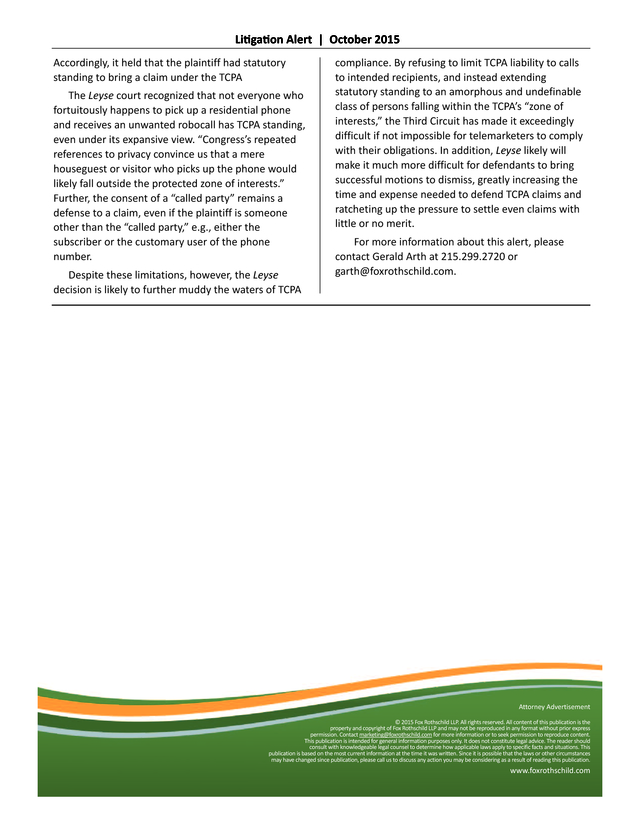Description
Litigation
OcTOBer 2015
Businesses ThaT PLace TeLemarkeTing caLLs
Face exPanded LiaBiLiTy
By Gerald E. Arth
For businesses that make telemarketing calls to
residential telephone lines using an artificial or
prerecorded voice, a new Third Circuit Court of
Appeals decision expands considerably the scope of
potential liability under the Telephone Consumer
Protection Act (TCPA) for errant calls and makes it
harder to avoid running afoul of the strictures of the
statute.
In a new precedential opinion, the Third Circuit
held that a “regular user” of a residential telephone
has standing to sue under the TCPA, even if that user
is not the intended recipient of the call or the
subscriber to the line. Leyse v. Bank of America Nat’l
Ass’n, No.
14-4073 (3d Cir. Oct. 14, 2015). The TCPA generally makes it unlawful “to initiate any telephone call to any residential telephone line using an artificial or prerecorded voice to deliver a message without the prior express consent of the called party” except in emergencies or in circumstances exempted by the Federal Communications Commission.
The TCPA permits any “person or entity” to bring an action to enjoin violations of the statute and/or recover actual damages or statutory damages ranging from $500 to $1,500 per violation. In Leyse, the plaintiff was a man who answered a prerecorded telemarketing call from Bank of America on a residential landline he shared with his roommate. The roommate was the subscriber for the telephone number and the intended recipient of the call. The plaintiff’s purported class action against Bank of America was dismissed by the trial court on the ground that he was not the “called party” under the TCPA and thus lacked statutory standing to assert a claim. The district court determined that only the “intended recipient” of a robocall is a “called party” for purposes of the TCPA. The Third Circuit reversed, finding that because the plaintiff was a “regular user of the phone line who occupies the residence being called,” he fell within the “zone of interest” in privacy, peace and quiet that Congress intended the TCPA to protect and therefore had statutory standing to sue for violation of the act. Interestingly, the Third Circuit actually sidestepped the issue of whether “called party” is limited to “intended recipient,” although it expressed doubt that the definition could be so limited.
Instead, the court focused on the intent of Congress in protecting consumers from intrusive telemarketing calls in their homes to conclude that “it is clear that the [TCPA’s] zone of interests encompasses more than just the intended recipients of prerecorded telemarketing calls. It is the actual recipient, intended or not, who suffers the nuisance and invasion of privacy.” www.foxrothschild.com . Litigation alert | October 2015 Accordingly, it held that the plaintiff had statutory standing to bring a claim under the TCPA The Leyse court recognized that not everyone who fortuitously happens to pick up a residential phone and receives an unwanted robocall has TCPA standing, even under its expansive view. “Congress’s repeated references to privacy convince us that a mere houseguest or visitor who picks up the phone would likely fall outside the protected zone of interests.” Further, the consent of a “called party” remains a defense to a claim, even if the plaintiff is someone other than the “called party,” e.g., either the subscriber or the customary user of the phone number. Despite these limitations, however, the Leyse decision is likely to further muddy the waters of TCPA compliance. By refusing to limit TCPA liability to calls to intended recipients, and instead extending statutory standing to an amorphous and undefinable class of persons falling within the TCPA’s “zone of interests,” the Third Circuit has made it exceedingly difficult if not impossible for telemarketers to comply with their obligations. In addition, Leyse likely will make it much more difficult for defendants to bring successful motions to dismiss, greatly increasing the time and expense needed to defend TCPA claims and ratcheting up the pressure to settle even claims with little or no merit. For more information about this alert, please contact Gerald Arth at 215.299.2720 or garth@foxrothschild.com. Attorney Advertisement © 2015 Fox Rothschild LLP.
All rights reserved. All content of this publication is the property and copyright of Fox Rothschild LLP and may not be reproduced in any format without prior express permission. Contact marketing@foxrothschild.com for more information or to seek permission to reproduce content. This publication is intended for general information purposes only.
It does not constitute legal advice. The reader should consult with knowledgeable legal counsel to determine how applicable laws apply to specific facts and situations. This publication is based on the most current information at the time it was written.
Since it is possible that the laws or other circumstances may have changed since publication, please call us to discuss any action you may be considering as a result of reading this publication. www.foxrothschild.com .
14-4073 (3d Cir. Oct. 14, 2015). The TCPA generally makes it unlawful “to initiate any telephone call to any residential telephone line using an artificial or prerecorded voice to deliver a message without the prior express consent of the called party” except in emergencies or in circumstances exempted by the Federal Communications Commission.
The TCPA permits any “person or entity” to bring an action to enjoin violations of the statute and/or recover actual damages or statutory damages ranging from $500 to $1,500 per violation. In Leyse, the plaintiff was a man who answered a prerecorded telemarketing call from Bank of America on a residential landline he shared with his roommate. The roommate was the subscriber for the telephone number and the intended recipient of the call. The plaintiff’s purported class action against Bank of America was dismissed by the trial court on the ground that he was not the “called party” under the TCPA and thus lacked statutory standing to assert a claim. The district court determined that only the “intended recipient” of a robocall is a “called party” for purposes of the TCPA. The Third Circuit reversed, finding that because the plaintiff was a “regular user of the phone line who occupies the residence being called,” he fell within the “zone of interest” in privacy, peace and quiet that Congress intended the TCPA to protect and therefore had statutory standing to sue for violation of the act. Interestingly, the Third Circuit actually sidestepped the issue of whether “called party” is limited to “intended recipient,” although it expressed doubt that the definition could be so limited.
Instead, the court focused on the intent of Congress in protecting consumers from intrusive telemarketing calls in their homes to conclude that “it is clear that the [TCPA’s] zone of interests encompasses more than just the intended recipients of prerecorded telemarketing calls. It is the actual recipient, intended or not, who suffers the nuisance and invasion of privacy.” www.foxrothschild.com . Litigation alert | October 2015 Accordingly, it held that the plaintiff had statutory standing to bring a claim under the TCPA The Leyse court recognized that not everyone who fortuitously happens to pick up a residential phone and receives an unwanted robocall has TCPA standing, even under its expansive view. “Congress’s repeated references to privacy convince us that a mere houseguest or visitor who picks up the phone would likely fall outside the protected zone of interests.” Further, the consent of a “called party” remains a defense to a claim, even if the plaintiff is someone other than the “called party,” e.g., either the subscriber or the customary user of the phone number. Despite these limitations, however, the Leyse decision is likely to further muddy the waters of TCPA compliance. By refusing to limit TCPA liability to calls to intended recipients, and instead extending statutory standing to an amorphous and undefinable class of persons falling within the TCPA’s “zone of interests,” the Third Circuit has made it exceedingly difficult if not impossible for telemarketers to comply with their obligations. In addition, Leyse likely will make it much more difficult for defendants to bring successful motions to dismiss, greatly increasing the time and expense needed to defend TCPA claims and ratcheting up the pressure to settle even claims with little or no merit. For more information about this alert, please contact Gerald Arth at 215.299.2720 or garth@foxrothschild.com. Attorney Advertisement © 2015 Fox Rothschild LLP.
All rights reserved. All content of this publication is the property and copyright of Fox Rothschild LLP and may not be reproduced in any format without prior express permission. Contact marketing@foxrothschild.com for more information or to seek permission to reproduce content. This publication is intended for general information purposes only.
It does not constitute legal advice. The reader should consult with knowledgeable legal counsel to determine how applicable laws apply to specific facts and situations. This publication is based on the most current information at the time it was written.
Since it is possible that the laws or other circumstances may have changed since publication, please call us to discuss any action you may be considering as a result of reading this publication. www.foxrothschild.com .













